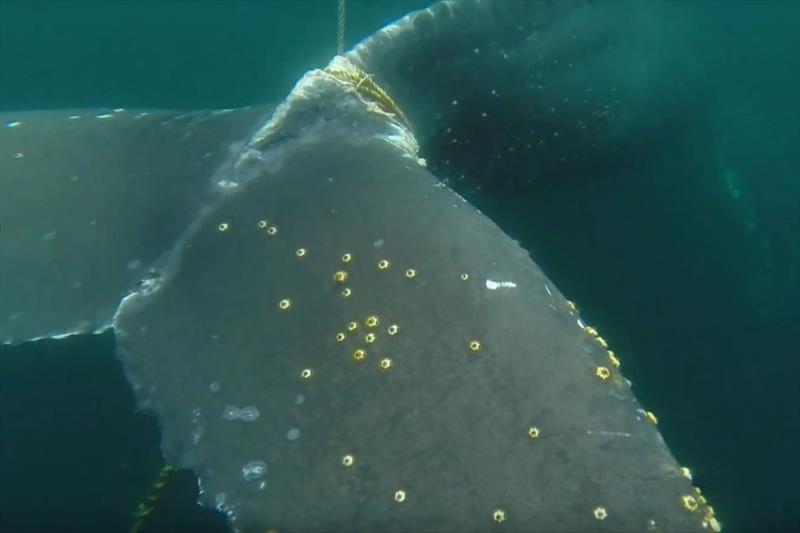
Teams free entangled humpback whale off Santa Cruz Island
by NOAA Fisheries 29 Apr 2020 15:11 UTC

Tightly wrapped ropes cut deeply into the tail of an entangled humpback whale © NOAA Fisheries
A trained team freed a humpback whale entangled in lines from a prawn trap set off Santa Cruz Island on Tuesday afternoon, April 14, 2020.
The team from TowBoatUS Ventura and Channel Islands Marine and Wildlife Institute successfully removed most of the lines entangling the 25 to 30-foot whale. Some of the line was deeply embedded and could not be removed, but experts are hopeful that line may loosen and fall off over time.
The lines from the prawn gear had entangled the whale, trapping it so it could not continue.
A fisherman reported the entangled whale to the U.S. Coast Guard about noon on Monday. TowBoatUS Ventura confirmed and documented the entanglement Monday afternoon, setting the stage for a response.
TowBoatUS Ventura returned to the location on Tuesday morning with a trained disentanglement team from Channel Islands Marine & Wildlife Institute. An accompanying vessel was on hand and available to assist.
"The strong cooperation and coordination led to a safe and successful outcome for this whale," said Justin Viezbicke, California Stranding Coordinator for NOAA Fisheries West Coast Region. "We are fortunate that we had a trained and experienced team who responded quickly and safely."
Entanglements along the West Coast have increased in the last decade. This may reflect various factors including increasing whale populations and more overlap of whales and fishing areas. Working groups of fishermen; researchers; and state, tribal, and federal fisheries managers are trying to minimize the risk of entanglements off California, Oregon, and Washington.
Entangled whales can be dangerous and should be approached only by trained response teams authorized by NOAA Fisheries. Network partners have invested much of their own time in training for and responding to entanglements in addition to training they receive from NOAA Fisheries. We depend on these response partners along the West Coast to respond to entanglements.
Prompt reporting is the best way to help entangled whales.
Report entangled whales on the West Coast to our 24/7 Hotline by calling (877) SOS-WHALe (877-767-9425) or hailing the U.S. Coast Guard on VHF Channel 16. If an authorized response is needed, please stay with the whale while you are able, if it is safe to do so.